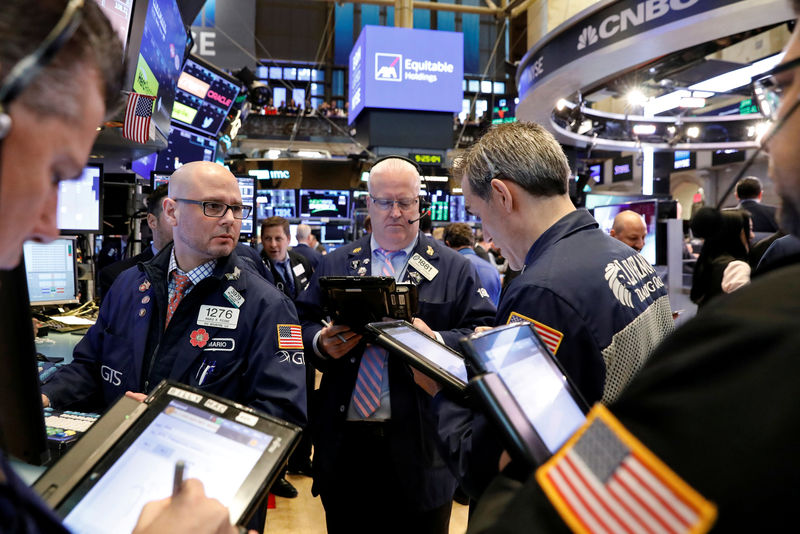By Caroline Valetkevitch
NEW YORK (Reuters) - U.S. stocks ended lower on Tuesday, weighed down by lingering uncertainty over the outcome of trade talks between the United States and China and declines in energy and industrial shares.
President Donald Trump on Tuesday said he was not pleased with recent trade talks between the United States and China and earlier said there was no deal yet with China on ZTE (HK:0763) Corp (SZ:000063).
Trump floated a plan to fine ZTE and shake up its management after his administration considering rolling back more severe penalties imposed for violating U.S. sanctions by shipping goods to Iran.
Trump also said there was a "substantial chance" his summit with North Korean leader Kim Jong Un will not take place as planned on June 12.
The president's comments come after U.S. Treasury Secretary Steven Mnuchin said over the weekend that the two countries had put the prospect of a trade war "on hold" and agreed to hold more talks to boost U.S. exports to China.
"As day worn on, Trump's comments about North Korea and not having a deal with ZTE just brought people back from yesterday's euphoria into more of a reality that this issue with trade is not going to end as quickly as many had thought," said Robert Pavlik, chief investment strategist and senior portfolio manager at SlateStone Wealth LLC in New York.
"So you're seeing a little bit of giveback," he said.
The industrial sector (SPLRCI) dipped 1.3 percent, a day after posting its best percentage gain in nearly two months on the trade truce, while the energy index (SPNY) also fell 1.3 percent.
Tesla Inc (O:TSLA) shares fell 3.3 percent, sending the stock to its lowest close since early April, a day after Consumer Reports said the company's new Model 3 car, despite many positives, had "big flaws," highlighting issues with braking. Tesla Chief Executive Elon Musk late on Monday tweeted that the braking flaw can be fixed with a software update, and Consumer Reports said it would retest the brakes.
The Dow Jones Industrial Average (DJI) fell 178.88 points, or 0.72 percent, at 24,834.41, the S&P 500 (SPX) lost 8.57 points, or 0.31 percent, to 2,724.44 and the Nasdaq Composite (IXIC) dropped 15.58 points, or 0.21 percent, to 7,378.46.
Shares of Micron Technology Inc (O:MU) climbed 6.4 percent after the memory-chip maker announced a $10 billion stock-buyback plan.
The financials sector (SPSY) rose 0.6 percent on hopes that a bill aimed at easing bank rules, put in place after the financial crisis, could be passed as soon as this week.
The consumer discretionary index (SPLRCD) fell 0.5 percent after warnings from retailer Kohl's and auto parts seller Autozone.
Kohl's (N:KSS) tumbled 7.4 percent, weighing on other retailers, after forecasting slower growth in the second half of the year.
Autozone (N:AZO) sank 9.5 percent after warning that higher costs would persist due to wage pressure.
Steel stocks climbed after the United States said it would slap steep import duties on steel products with origins in China but shipped from Vietnam to evade anti-dumping orders.
Carmakers Ford (N:F), General Motors (N:GM) and Fiat Chrysler (N:FCAU) gained slightly after Beijing announced tariff cuts on car imports.
Declining issues outnumbered advancing ones on the NYSE by a 1.49-to-1 ratio; on Nasdaq, a 1.33-to-1 ratio favored decliners.
The S&P 500 posted 29 new 52-week highs and one new low; the Nasdaq Composite recorded 146 new highs and 36 new lows.

About 6.2 billion shares changed hands on U.S. exchanges. That compares with the 6.6 billion daily average for the past 20 trading days, according to Thomson Reuters data.